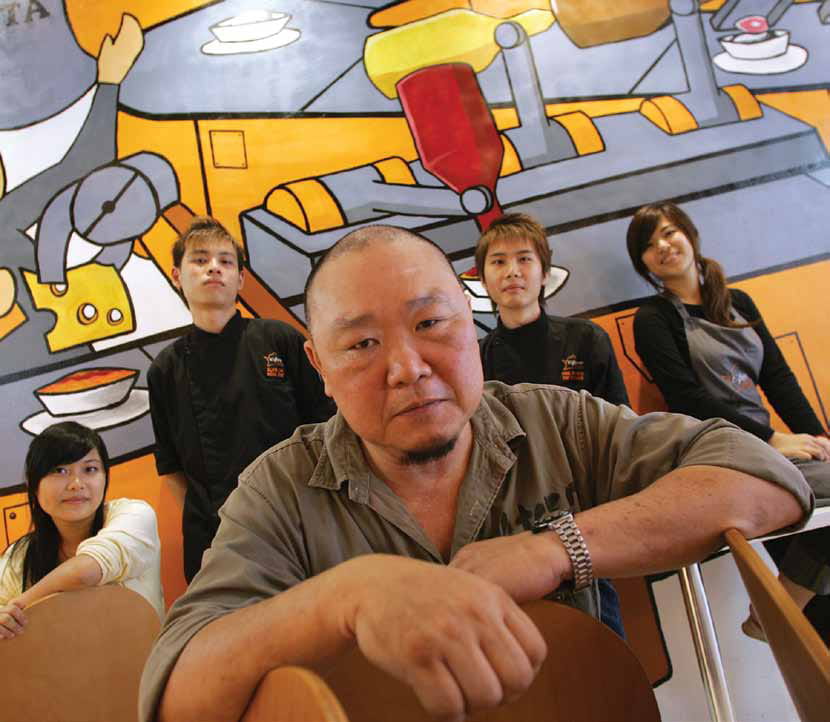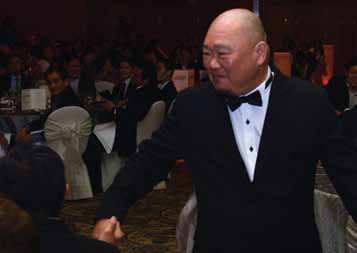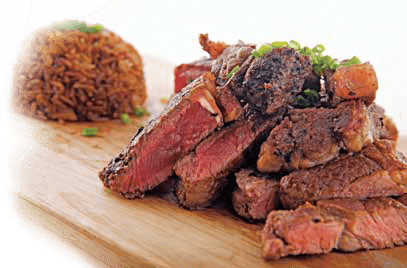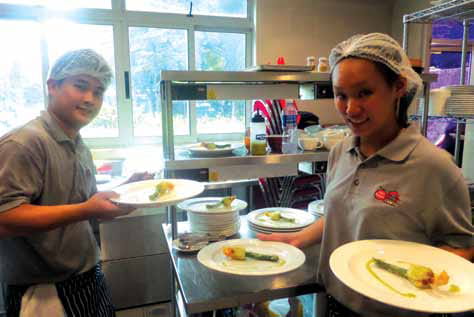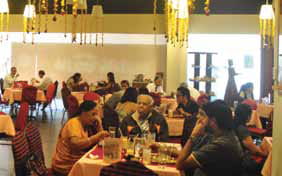Stories > Food for Good
Food for Good
Eighteen Chefs is Benny Se Teo’s second chance. A self-taught cook, he remains dedicated to his social mission of giving other ex-offenders an option to make good their lives.
Food for Good
Food is a national passion. With that in mind, three local social enterprises have been turning out good food to support various worthy causes.
By Amita Sarwal
e had never tasted coq au vin or aglio olio but Se Teo was bent on heading for celebrity Jamie Oliver’s London outpost — Fifteen, a social enterprise to groom youths-at-risk into professional chefs. After his Chinese restaurant folded, Se Teo got a kick start as the first Singaporean to undergo an internship at Fifteen in late 2006 where he had the opportunity to work with Gennaro Contaldo, Oliver’s chef-mentor. Se Teo was then 46, working among 18 to 19-year-olds at Fifteen. During his month long stint cooking Western cuisine, the self-taught chef witnessed how ex-offenders were turned into fine chefs through an apprenticeship programme.
London was the breakthrough Se Teo desperately needed. Returning to Singapore, he set up Eighteen Chefs (www.eighteenchefs.com) in 2007 at Tiong Bahru Plaza with financial support from friends. Six years on, Se Teo still dons his ‘Chef Benny’ jacket, and oversees another outlet at Orchard Cineleisure. Eighteen Chefs serves contemporary Western dishes adapted with the help of recipes from his mother’s cookbook. Signature dishes are the ‘64 Degrees Eggs,’ referring to soft boiled eggs cooked to the specific temperature of 64 degrees celcius and the ‘Heart-Attack Fried Rice’ — fried rice with soya sauce paired with grilled New York beef steak.
As for the reason behind the name Eighteen, Se Teo explains that Eighteen is the triad gang his late father, an opium addict,belonged to. He says, “All my life, I was involved in getting the money, getting the heroin, getting the next fix. I was addicted to drugs by 17. My family gave up on me as I went in and out of rehab centres over 30 times. Upon release in 1993, every job I applied for, I got rejected because of my past convictions.”
“Converting to Christianity in 1990 opened my eyes to the condition I was in. I knew I had to change and do something good with my life.” The turning point came he was rushed to hospital once — he fainted owing to internal bleeding of his small intestine. “I was handcuffed and attached to a machine. I thought I was going to die so I prayed to God.”(source: Youtube video 2009 by Sarah Amnah and Karen Teng). As of today, Se Teo has been drug-free for over 20 years.
Comeback Chef
Eighteen Chefs is former heroin addict Benny Se Teo’s fulfillment of his social mission to cook up a better future for ex-offenders and youth-at-risk.
Left: Founder Benny Se Teo, steps forward to receive his Social Enterprise award from the Singapore President at a gala dinner jointly organised by The Business Times and OCBC Bank on August 31 this year.
“Upon release in 1993, every job I applied for, I got rejected because of my past convictions.”
The man received special recognition for his work last December 6th, when he was honoured by President Tony Tan Keng Yam at the Istana as the President’s Challenge Social Enterprise of the Year 2012. Se Teo recalls, “I never expected to win. The judges grilled me on my profit and loss statement, personal life and other stuff. I’m uneducated. To get this award is a big pat on my back. I’m on the right track. He adds, “I realised that social enterprise is a business that is solving a problem in society. For me, it’s giving ex-convicts a second chance.”
Cooking Up a Future
Se Teo sees ex-convicts as an untapped workforce to plug Singapore’s serious labour gap. He strongly believes Eighteen Chefs offers a sense of security to his employees and this accounts for many success stories. He relates one example. “One of my beneficiaries from our service crew started at S$1,200 a month. Within a year, he became my Food and Beverage Director earning S$2,500. Soon after, he left to join a Korean restaurant chain as a General Manager. With pride, Se Teo adds, “We are the only restaurant appointed by e2i (Employment and Employability Institute) that trains locals and certifies them for the food industry.”
Se Teo wants customers to return for his signature ‘Heart- Attack Fried Rice’, as much as for supporting his social mission.
Catering to Special Needs
The Joan Bowen Cafés equip youth with special needs with life skills and a new network of friends.
By Melissa De Silva
Joan Bo Wen and Ang Guang Hwa cater a lunch based on Chef Melina Yong’s recipies.
roprietor Jeanne Seah tells you candidly that her two Joan Bowen Cafés (www.joanbowen.com) at Jalan Wangi and St. Andrews Village could afford more business because they ‘really need to make a profit.’
“We are building a community of friends for them (youth with special needs), friends they would never have otherwise. Special kids are not idiots. Put your money in them, love them and see what they can do.”
Both outlets serve Western grills and steaks, and specials like chilli crab pasta. The first cafe, named after her 23-year-old learning disabled daughter Joan Bo Wen, was set up as a culinary training centre for youth with special needs in 2009.
“They are just a bit slower and have less memory retention and communication skills, but they are very, very steady,” Seah says of her kitchen crew. Soon Hock, for example, does an inventory of ingredients in the freezer. “Soon Hock is a high functioning person with Down’s syndrome,” she says. Seah is proud of the fact that these kids can remember recipes and reproduce them with 75% consistency.
In May, Singaporean Chef Melina Yong trained Joan Bowen’s staff to create fine dining dishes from her book, Wine Dinners: Pairing Asian Flavours with Bordeaux Wines. The team recreated the dishes for lunch for the Land Transport Authority and the meal was much praised.
Since July, Joan Bowen’s 12 staff — of 22 to 36 years old, including Seah’s daughter — have been benefitting from individual and group sessions with a psychologist who helps them with communication skills, emotional management and basic composition. “He guides them on language to use, like not to say ‘stupid’,” says Seah.
His services, sponsored by Asia Philanthropic Ventures, are for a one-year pilot project in continuing intervention. Intervention is instrumental to help such individuals live their potential. Seah points out that in Singapore, intervention stops at 18. “Why?” she asks, “People with special needs are never ‘cured’. We want to teach them to think, how to live independently and with dignity.”
Seah is noticing a new maturity in their communication and willingness to ask questions, even an ability to make a bit of conversation with customers. “They are just happier,” she says. Sometimes, there are moments where she feels like throwing in the towel. Then she remembers it is not just about her daughter “but all the other kids who have become part of the family. We are building a community of friends for them, friends they would never have otherwise. Special kids are not idiots. They are hireable. Put your money in them, love them and see what they can do.”
Soul Stirring Food
Annalakshmi is a fine example of a social entreprise where the business model is driven primarily to promote Indian culture rather than profit.
nnalakshmi’s (www.annalakshmi.com.sg) concept was inspired by Swami Shantanand Saraswathi, a Hindu monk from India who came to Singapore in 1972. In 1982, he started the Temple of Fine Arts offering free performances to promote Indian music and dance, a cultural and service-oriented non-profit organisation with centres in Malaysia, India, Singapore, Australia and Sri Lanka. In 1986, he suggested the formation of a vegetarian restaurant which would generate income to support the Temple of Fine Arts and Indian culture in general.
Retired surgeon and senior volunteer Dr R. Rajagopalan recalls: “A cafeteria came up by default when mothers or or grandmothers, while waiting for their children to finish their classes at Temple of Fine Arts, would help prepare sandwiches or snacks. Using this untapped talent, they formed the backbone for Annalakshmi’s kitchen. Most of us were then in 9-to-5 jobs with no idea of how to run a restaurant but together the concept took off smoothly and Annalakshmi has been in existence for 27 years now.”
Pay As You Wish
Initially, for 10 years, Annalakshmi operated with a payment mode like in any other restaurant. In 1999, they introduced the ‘Eat what you like. Pay as you wish’ policy — in which payment is decided by the guest rather than a fixed-pricemenu. This has proven to be successful with guests at Annalakshmi. Proceeds from guests (Annalakshimi and artperformances) pay for ingredients and operating costs of the restaurant as well as sponsoring underprivileged students who attend Temple of the Arts workshops.
Annalakshimi’s cornerstone of sustainability for the past 27 years has been the community goodwill of regular guests,volunteers, landlords and vendors despite frugal management of resources. Manager Suresh Krishnan explains: “How did our grandmothers, mothers or aunts manage rising costs? Keep wastage to the minimum and manage with what we have. Our intention is to serve the community through our cuisine. It isan integral part of our art and culture and each sustains the other.” Today, Annalakshmi caters for private functions in the restaurant and outdoor events for offices, homes and weddings.
Annalakshimi’s ‘Pay as You Feel’ policy continues to attract regulars, volunteers and tourists.
“Volunteerism is … where one gives something back according to one’s own capacity that involves some sacrifice, but in a way that the individual gives freely, with love and happiness.”
Giving Freely
Volunteerism figures prominently at Annalakshmki. It relies largely on about 50 volunteers, some regular, others on an ad hoc basis who serve in several ways: teaching dance and music or participating in public performances at The Temple of Fine Arts; cooking or serving at the restaurant; coaching at the tuition centre, Siva Santa Vidya Mandhir; joining in medical service missions to Malaysia or India, or promoting visual arts though its arts boutique, Lavanya Arts.
Krishnan defines volunteerism as giving back to society freely with love and happiness. He says: “Ultimately, it’s about doing our bit for our fellow human beings in our own humble way. It leads to happiness and joy which is good for the individual, good for the community, good for the country and ultimately for human kind at large.”
Adds Manager Suresh Krishnan, “The money guests at Annalakshmi and the Temple of Fine Arts give willingly has multiplying effects and tremendous value to grow — opening the door of abundance. It has wings. It circulates and benefits people more than pre-determined money paid for a meal.”
“At the end of the day, concludes regular volunteer Rajagopalan: “We ask ‘How many people were served?’ Not ‘How much money was collected?’ Our maxim being: Serve.Love. Give.”
Loyal supporters have kept Indian arts in Singapore alive, largely through generous donations of time and money.

